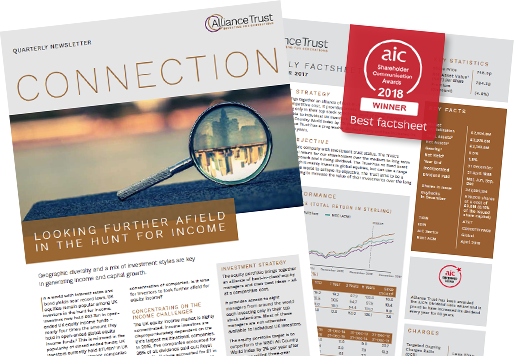Opportunities for value and growth from the US lie in the big tech FAAMG stocks and also in smaller companies. The key thing is getting the right balance as Alliance Trust’s expert fund managers explain.
When looking at the US market investors can be swayed by the big technology stocks that permeate our day to day lives. These have been grouped together under the acronym FAANGs (Facebook, Amazon, Apple, Netflix, Google) or if you take Netflix out of the mix and add Microsoft – the FAAMGs.
We asked Alliance Trust stock pickers if and why they invest in the latter group now, how they see them performing in the future and whether they are also looking at US stocks other than the big hitters.
A question for investors is whether these big stocks can offer value or growth or both or whether the opportunities for value and growth lies in long-term holdings of small possibly currently undervalued stocks.
The US market
The US equity markets have enjoyed strong performance since the Global Financial Crisis (GFC). Since the start of 2009, the S&P 500 has produced an annual return of 15.9% compared to its historical annualized average return of around 10% since its 1926 inception[1].
The flip side to this strong performance is that its valuation today is very high. Coming out of the GFC, the S&P 500 had a low valuation of 10.5x forward earnings. That multiple has more than doubled, and as of August 31, 2021, its forward price/earnings (P/E – ie the share price divided by the company’s net earnings per share) ratio is 21.1x. This is 40% above the post-GFC average of 15.2x[1].
Andrew Wellington, co-founder and chief investment officer at Lyrical explains that a high P/E does not necessarily mean the market will collapse anytime soon.
“Expensive markets can get even more expensive,” says Wellington. “However, history would suggest caution, as investing in the market at a high P/E ratio has almost always resulted in disappointing long-term returns.” [2]
The case for FAAMGs
There is still both value and growth possible through investment in FAAMG stocks Amazon, Alphabet (Google) and Microsoft, according to C T Fitzpatrick, founder and chief investment officer at Vulcan Value Partners.
“All three have experienced meaningful compounding of their intrinsic values since we have owned them,” says Fitzpatrick. “All three have seen solid, double-digit stock price returns over the last eighteen months. We still believe these companies are deeply discounted due to the growth in the values of the underlying businesses, which in all three cases is outpacing price appreciation.”[3]
Amazon produces robust free cash flow, and it is expected to endure and compound well into the future, according to Fitzpatrick, as the pandemic has accelerated many trends directly benefitting Amazon’s major business segments: retail, Amazon Web Services (AWS), and advertising. Microsoft and Alphabet have experienced a similar acceleration in demand for their products and services. Through one business segment, they, along with Amazon, are leading providers of hyperscale Cloud computing services and stand to benefit in a post-pandemic world.
“Amazon has experienced exceptional returns through thoughtful capital allocation and astounding topline growth,” says Fitzpatrick. “As long-term investors, we focus on Amazon’s value stability and growth over the next decade rather than its stock price over the next quarter. Through that 5+ year lens, we believe the market continues to underestimate the value of this truly wonderful business.”
“It is hard for short-term investors to appreciate how enduring Alphabet and Microsoft’s business models are likely to be over the long term. We continue to believe that a meaningful margin of safety exists between value and price and are happy to hold Alphabet and Microsoft, Fitzpatrick adds.
Wellington argues that while the valuation problem is pervasive, the largest stocks are unfairly getting the blame.
“FAAMG stocks are not cheap, but most are not expensive either when compared to the S&P 500 average,” says Wellington. “The average FAAMG forward P/E is 30x, ranging from Facebook at 20x to Amazon at 45x. Apple, Google and Facebook all have P/Es in the 20s, and given their great business models and growth rates, to us they look more attractive than the S&P 500 at 21x. Microsoft at 35x and Amazon at 45x are more difficult valuations to get comfortable with, but there is a chance they could grow fast enough to justify those valuations.”[4]
Outside of FAAMG
That said, Alliance Trust’s stock pickers are equally exploring those opportunities outside of the FAAMGs to the extent that Lyrical does not own any.
“While we do not think the FAAMGs are to blame for the US market valuation problem and while these stocks may be better than the S&P 500, that is not a high enough bar to enter our portfolio,” says Wellington.
On the other hand, he says there are some wonderful e-commerce companies that he owns at a fraction of Amazon’s lofty multiple. For example, eBay, the world’s largest marketplace for used and out of season goods. eBay may not be growing as fast as AMZN, he says but it still is growing at 15% per annum, roughly triple the historical rate of the S&P 500.
“Despite its faster growth, once you adjust for the cash and investments eBay holds, you can own the business for about 12.5x forward earnings, a 40% discount to the S&P 500 multiple and 70% less than Amazon. At 12.5x forward earnings, eBay provides an attractive earnings yield of 8% and growing, as it focuses on growing the wallet share of its core customer, who is seeking the treasure hunt experience,” says Wellington.[5]
Even cheaper he says, is Qurate Retail, the leader in home shopping with QVC and HSN. Qurate’s earnings have doubled from 2018 to 2021, and the stock is valued at less than 5x forward earnings. That is an earnings yield of over 20% for a virtual retailer with one of the most loyal customer bases in retail (the company’s core 8 million shoppers return each year at a 90% rate).
“Qurate operates a flexible business model, holding limited inventory and quickly shifting to sell whatever its customers want. As a result, in the last two economic downturns when most traditional retailers saw significant revenue declines, Qurate’s revenue fell only 1% in the Global Financial Crisis and grew 5% during the pandemic. The business is so cash generative that it made two special cash dividend payments in 2020 worth about 30% of today’s stock price,” Wellington adds. [6]
Sands Capital, while maintaining some exposure to Amazon and Facebook as good businesses to hold, is also adding some diversification through investing in other businesses outside the FAAMGs.
“As the index has become dominated by its largest businesses, we believe differentiation will be key to delivering excess returns in the future.,” says Michael Sramek, senior portfolio manager and managing director at Sands Capital. “While the rise of mega-caps hasn’t been without merit, the next decade will look very different in terms of growth leadership, in our view.”[7]
Sramek highlights several companies he believes offer compelling growth opportunities for the next decade beyond the mega-caps.
DoorDash is the leading food-delivery platform in the United States by market share, and Sramek expects food delivery spending to more than double over the next five years. “Longer term, we expect greater contribution from additional on-demand local-delivery needs, such as DoorDash’s nascent grocery and convenience businesses,” he says.
Then there is Snowflake. “We believe Snowflake has the potential to be a generational technology leader as it expands beyond its core cloud data warehouse into emerging use cases such as data sharing. Longer-term, Snowflake has an opportunity to be a foundational technology upon which future applications are built,” says Sramek.
Finally, Twilio. “We view Twilio as the underlying technology that will enable the dramatic digital transformation taking place within the $1.5 trillion communications market. Effectively, we believe Twilio serves as atoll collector on digital communication,” says Sramek.
Fitzpatrick owns several other companies outside of the FAAMGs group whose values he expects to continue to grow at double-digit rates due to outstanding business models.
One is NVIDIA, the dominant supplier of Graphics Processing Units (GPUs) worldwide. NVIDIA’s GPUs are at the intersection of several important computing trends including the movement to the Cloud, artificial intelligence, autonomous vehicles, edge computing, gaming, and more.
Another, Salesforce is the dominant provider of customer relationship management (CRM) software and technology. Over the years, Salesforce has expanded its services to capture the entire lifecycle of a customer, including the ability to integrate third-party applications. Salesforce has high retention rates, pricing power, a large and growing addressable market, strong free cash flow, and a competitive moat. Salesforce is spending aggressively to capture a larger share of its rapidly growing total addressable market.[8]
“As a result,” says Fitzpatrick, “We believe that Salesforce’s value should compound through continued investment in top line growth and margin expansion over time. The recent effects of Covid-19 have only improved its prospects and future returns.
“As value investors, we will only purchase a company if its price is lower than our estimate of its intrinsic value. Value investors can buy companies that grow. They can buy companies with higher multiples. When we value a company, growth rates are reflected in our valuation. We also own companies that are slower growing, with relatively low multiples, and these companies can be good investments as well. We are looking for businesses with inherently stable values and are agnostic to earnings growth rates.”[9]
Craig Baker, chair of Alliance Trust’s Investment Committee, says: “As you would expect with a multi-manager approach with stock pickers running high conviction portfolios, we own some of the FAAMGs, but not others. But, perhaps more importantly, these are not the only US growth stocks that our managers are finding really interesting at the moment. We also have attractive exposure to many lesser-known names in the US market which could have the potential to become the FAAMGs of tomorrow. The Company’s portfolio should be able to perform well regardless of whether the FAAMGs continue their rise or struggle to grow much further from here. If anything, a broadening out of the market leadership would be a good thing for us, although we should continue to do reasonably well even if that isn’t the case.”
Past performance is not a reliable indicator of future returns. This material contains the opinions of the manager and such opinions are subject to change without notice. Forecasts, estimates and certain information contained herein should not be considered as investment advice or a recommendation of any particular security, strategy or investment product. Information contained herein has been obtained from sources believed to be reliable, but not guaranteed.
TWIM is the appointed Alternative Investment Fund Manager of Alliance Trust plc. Alliance Trust plc is a listed UK investment trust and is not authorised and regulated by the Financial Conduct Authority.
More news






